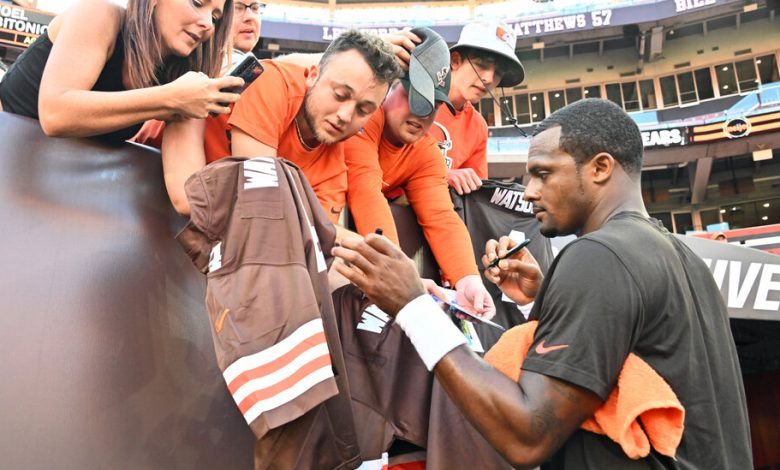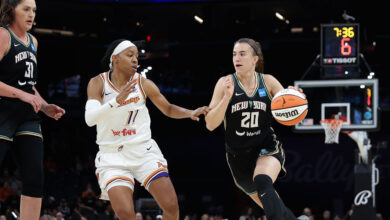How the N.F.L. Stays So Popular, Despite Its Many Scandals

As it so often has, the N.F.L. league office spent the off-season dealing with crises caused by its players, coaches and team owners.
Deshaun Watson, a star quarterback, was suspended and fined after two dozen women accused him of coercing them or behaving lewdly during massages. Britt Reid, a former position coach for the Kansas City Chiefs, is scheduled to plead guilty to driving while intoxicated in an incident that severely injured a child after Reid left the team’s practice facility. Dan Snyder, the owner of the Washington Commanders, spent much of the summer on a yacht, seemingly dodging a subpoena to testify before a congressional committee that is still investigating his franchise for a toxic workplace.
As the N.F.L. season kicks off this week, however, it is a good bet that these scandals — and many others from a troubling off-season — will receive little or no attention at games or on television. It is likely that the business of the N.F.L. will remain as strong as ever.
“The N.F.L. in particular can accommodate contradiction and scandal and seems to maybe not be impervious, but certainly is very good at deflecting it and recovering,” said Travis Vogan, a professor at the University of Iowa who researches sports and American culture. He said the N.F.L.’s public relations strategy was to “individualize” scandals, but “the fact that it happens as often suggests that there is a systemic element to it.”
Television viewership for the N.F.L. last season was its strongest in six years, even as most television programming around it craters in popularity. Last year television networks committed about $110 billion for the rights to show the N.F.L. for the next decade, ensuring its financial success no matter what happens with viewership around the edges. The league is on track to meet Commissioner Roger Goodell’s goal of earning $25 billion in revenue annually in 2027.
“It is a freight train going down the tracks, and it is just gaining speed and gaining momentum each year,” Sean McManus, the chairman of CBS Sports, said at a press event last week.
Among the incidents the league contended with this off-season:
-
The N.F.L. fined and suspended Miami Dolphins owner Stephen Ross after an investigation found he tampered, though it absolved him of accusations that he deliberately tried to lose games, saying he didn’t mean it when he suggested the idea to his coach.
-
The Buffalo Bills released the rookie punter Matt Araiza after he was accused of rape in a lawsuit, but only after they had already handed him the starting job despite some knowledge of the accusations.
-
Three Black coaches accused the league of racial bias in an ongoing lawsuit.
-
Henry Ruggs, a former Las Vegas Raiders first-round pick, has been charged with four felonies, including D.U.I. resulting in death, after prosecutors said he killed Tina Tintor, 23, when he drove his car 156 miles per hour and rear-ended her.
-
New Orleans Saints running back Alvin Kamara will go to trial later this month on charges that he punched a man eight times at a nightclub the night before the Pro Bowl in February.
Considering the N.F.L.’s enduring popularity despite these crises, it is temping to view the league as an unstoppable juggernaut.
But if you peer a bit into the future, the N.F.L.’s continued dominance does not look nearly as certain. Not because fan or advertiser boycotts will lead to radical change, but because of health concerns, demographics and marketing challenges.
The player pipeline to the N.F.L. is drying up, with fewer kids playing tackle football. In 2018, there were more than 100,000 fewer kids playing in high school than in 2008, a drop of almost 10 percent. The decrease in the number of younger children playing tackle football is even greater. After more than a decade of stories about the risk of concussions and head trauma from football, more and more parents say the sport is not appropriate for young people.
Football is still the most popular high school sport by far, but as the number of players shrinks and more of the country’s best athletes choose to play other sports, the quality of the N.F.L. will eventually suffer.
“This is something niche sports deal with all the time,” said Travis Dorsch, who directs the Families in Sport Lab at Utah State University and played professional football. He pondered a future where football was a regionally popular sport like lacrosse on the East Coast and hockey in the upper Midwest, with some of the best athletes gravitating toward other sports.
Dorsch stressed the need for coaches, educators and parents to provide a safer, more enjoyable experience for kids if participation rates are to rebound. The N.F.L. has also recognized the problem, and is putting money behind efforts like flag football and programs that the league says reduce concussions.
The N.F.L. is under pressure to grow for a host of reasons — among them, to meet Goodell’s revenue targets, avoid bitter labor fights with players and keep owners happy by undergirding constantly growing franchise values.
Perhaps N.F.L. fans will someday turn away from the N.F.L. because of the bad headlines it sometimes generates. But even now, the league is competing to hold its audience because it is challenged by more and more entertainment options. The league’s own marketing efforts signal that it believes it needs to expand beyond the traditional demographic of American men drinking beer on the couch on Sundays. N.F.L. viewers are getting older on average, and for the next decade most N.F.L. games will continue to be on traditional television despite the median viewer being almost 60.
The N.F.L. has long looked abroad, scheduling games in Mexico and England to attract fans there. This year the N.F.L. will play a regular-season game in Germany for the first time, and Goodell has broached the idea of games in South America.
The league is also increasingly marketing itself directly to women, trying to persuade those who might be casual fans — the league says almost half of Super Bowl viewers are women — to engage with the sport more fully. The sport is a harder sell if fans don’t believe the N.F.L. is concerned about domestic violence or mistreatment of women by its players, coaches and owners.
Research suggests sports fans are formed young, when they play a sport or watch it as a fan. With football mostly played by boys and young men in the United States, and potential fans in other countries having fewer opportunities to attend football games, these fans will be harder to win over than young American men.
The N.F.L. and football, in 2022, are deeply embedded in American culture. It is not merely a game or an entertainment option, but a ritual, a way people connect to their families and communities, a way they identify themselves. It is a unifying institution in a country that has fewer and fewer of them left. The game is deeply American, which perhaps better than anything else explains its hold on society despite a litany of problems.
“I think people expect football and sports to operate as this kind of escapist spectacle, and that at a certain level they are OK with the contradictions and the hypocrisy and even the discord that exists within it,” Vogan said. “People will say football is so American because it is about violence and capitalism and territory, and these myths of America, and maybe the hypocrisy and discord and corruption are just as American.”





